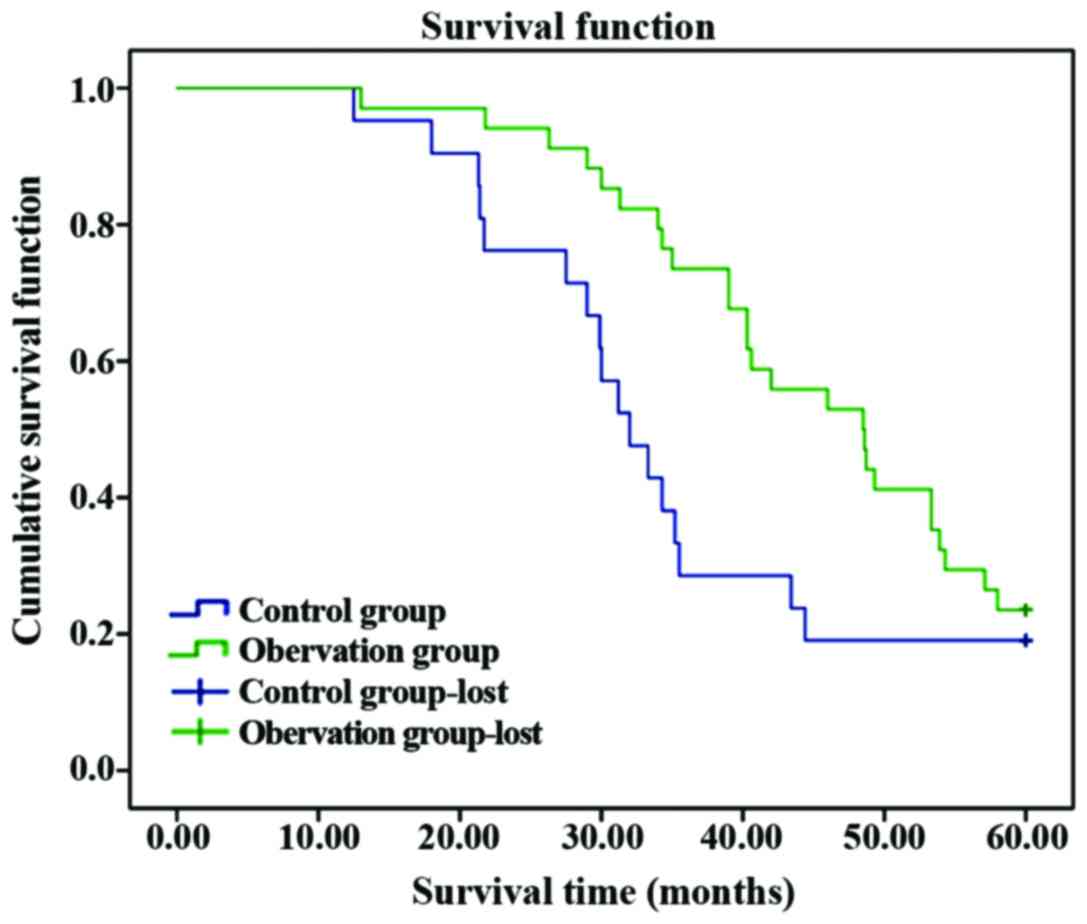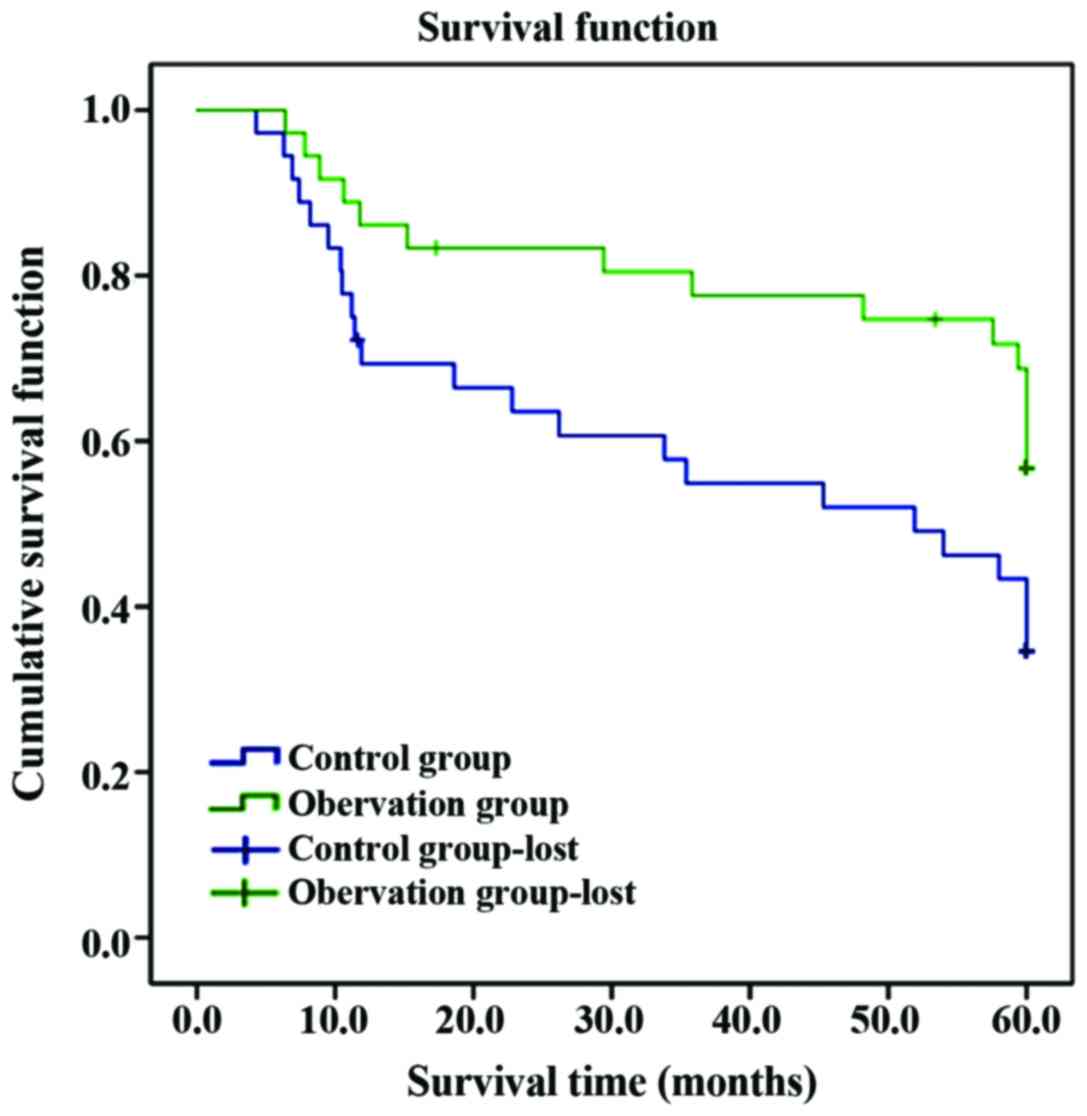|
1
|
Brenner H, Kloor M and Pox CP: Colorectal
cancer. Lancet. 383:1490–1502. 2014. View Article : Google Scholar : PubMed/NCBI
|
|
2
|
Kahi CJ, Boland CR, Dominitz JA,
Giardiello FM, Johnson DA, Kaltenbach T, Lieberman D, Levin TR,
Robertson DJ and Rex DK: Colonoscopy surveillance after colorectal
cancer resection: Recommendations of the US multi-society task
force on colorectal cancer. Gastrointest Endosc. 83:489–98.e10.
2016. View Article : Google Scholar : PubMed/NCBI
|
|
3
|
Page AJ, Weiss MJ and Pawlik TM: Surgical
management of noncolorectal cancer liver metastases. Cancer.
120:3111–3121. 2014. View Article : Google Scholar : PubMed/NCBI
|
|
4
|
Sotirchos VS, Petrovic LM, Gönen M,
Klimstra DS, Do RK, Petre EN, Garcia AR, Barlas A, Erinjeri JP,
Brown KT, et al: Colorectal cancer liver metastases: Biopsy of the
ablation zone and margins can be used to predict oncologic outcome.
Radiology. 280:949–959. 2016. View Article : Google Scholar : PubMed/NCBI
|
|
5
|
Fulong W and Pan Z: Operation time of
colorectal liver metastasis and choice of operation after
convertible therapy. Chin J Pract Surg. 33:656–659. 2013.
|
|
6
|
Corley DA, Jensen CD, Marks AR, Zhao WK,
Lee JK, Doubeni CA, Zauber AG, de Boer J, Fireman BH, Schottinger
JE, et al: Adenoma detection rate and risk of colorectal cancer and
death. N Engl J Med. 370:1298–1306. 2014. View Article : Google Scholar : PubMed/NCBI
|
|
7
|
Li J, Hao D, Wang L, Wang H, Wang Y, Zhao
Z, Li P, Deng C and Di LJ: Epigenetic targeting drugs potentiate
chemotherapeutic effects in solid tumor therapy. Sci Rep.
7:40352017. View Article : Google Scholar : PubMed/NCBI
|
|
8
|
Jagadish N, Parashar D, Gupta N, Agarwal
S, Sharma A, Fatima R, Suri V, Kumar R, Gupta A, Lohiya NK, et al:
A novel cancer testis antigen target A-kinase anchor protein
(AKAP4) for the early diagnosis and immunotherapy of colon cancer.
OncoImmunology. 5:e10789652016. View Article : Google Scholar : PubMed/NCBI
|
|
9
|
Dunet V, Halkic N, Prior JO, Anaye A,
Meuli RA, Sempoux C, Denys A and Schmidt S: Detection and viability
of colorectal liver metastases after neoadjuvant chemotherapy: A
multiparametric PET/CT-MRI study. Clin Nucl Med. 42:258–263. 2017.
View Article : Google Scholar : PubMed/NCBI
|
|
10
|
Truant S, Séquier C, Leteurtre E,
Boleslawski E, Elamrani M, Huet G, Duhamel A, Hebbar M and Pruvot
FR: Tumour biology of colorectal liver metastasis is a more
important factor in survival than surgical margin clearance in the
era of modern chemotherapy regimens. HPB. 17:176–184. 2015.
View Article : Google Scholar : PubMed/NCBI
|
|
11
|
Venderbosch S, Nagtegaal ID, Maughan TS,
Smith CG, Cheadle JP, Fisher D, Kaplan R, Quirke P, Seymour MT,
Richman SD, et al: Mismatch repair status and BRAF mutation status
in metastatic colorectal cancer patients: A pooled analysis of the
CAIRO, CAIRO2, COIN, and FOCUS studies. Clin Cancer Res.
20:5322–5330. 2014. View Article : Google Scholar : PubMed/NCBI
|
|
12
|
Alexandrescu S, Diaconescu A and Popescu
I.: Surg options synchronous liver metastases colorectal cancer.
Transl. J. Med. Res. 22:10–21. 2017.
|
|
13
|
Wagner M, Ronot M, Doblas S, Giraudeau C,
van Beers B, Belghiti J, Paradis V and Vilgrain V: Assessment of
the residual tumour of colorectal liver metastases after
chemotherapy: Diffusion-weighted MR magnetic resonance imaging in
the peripheral and entire tumour. Eur Radiol. 26:206–215. 2016.
View Article : Google Scholar : PubMed/NCBI
|
|
14
|
Bregendahl S, Emmertsen KJ, Fassov J,
Krogh K, Zhao J, Gregersen H and Laurberg S: Neorectal
hyposensitivity after neoadjuvant therapy for rectal cancer.
Radiother Oncol. 108:331–336. 2013. View Article : Google Scholar : PubMed/NCBI
|
|
15
|
Glimelius B, Ristamäki R, Kjaer M,
Pfeiffer P, Skovsgaard T, Tveit KM, Linné T, Frödin JE, Boussard B,
Oulid-Aïssa D, et al: Irinotecan combined with bolus 5-fluorouracil
and folinic acid Nordic schedule as first-line therapy in advanced
colorectal cancer. Ann Oncol. 13:1868–1873. 2002. View Article : Google Scholar : PubMed/NCBI
|
|
16
|
van Cutsem E, Lenz HJ, Köhne CH, Heinemann
V, Tejpar S, Melezínek I, Beier F, Stroh C, Rougier P, van Krieken
JH, et al: Fluorouracil, leucovorin, and irinotecan plus cetuximab
treatment and RAS mutations in colorectal cancer. J Clin Oncol.
33:692–700. 2015. View Article : Google Scholar : PubMed/NCBI
|
|
17
|
Heinemann V, von Weikersthal LF, Decker T,
Kiani A, Vehling-Kaiser U, Al-Batran SE, Heintges T, Lerchenmüller
C, Kahl C, Seipelt G, et al: FOLFIRI plus cetuximab versus FOLFIRI
plus bevacizumab as first-line treatment for patients with
metastatic colorectal cancer (FIRE-3): A randomised, open-label,
phase 3 trial. Lancet Oncol. 15:1065–1075. 2014. View Article : Google Scholar : PubMed/NCBI
|
|
18
|
Hamnvik OPR, Choueiri TK, Turchin A, McKay
RR, Goyal L, Davis M, Kaymakcalan MD and Williams JS: Clinical risk
factors for the development of hypertension in patients treated
with inhibitors of the VEGF signaling pathway. Cancer. 121:311–319.
2015. View Article : Google Scholar : PubMed/NCBI
|
|
19
|
Ciamporcero E, Miles KM, Adelaiye R,
Ramakrishnan S, Shen L, Ku S, Pizzimenti S, Sennino B, Barrera G
and Pili R: Combination strategy targeting VEGF and HGF/c-met in
human renal cell carcinoma models. Mol Cancer Ther. 14:101–110.
2015. View Article : Google Scholar : PubMed/NCBI
|
|
20
|
Jannuzzi AT, Özhan G, Yanar HT and
Alpertunga B: VEGF gene polymorphisms and susceptibility to
colorectal cancer. Genet Test Mol Biomarkers. 19:133–137. 2015.
View Article : Google Scholar : PubMed/NCBI
|
















